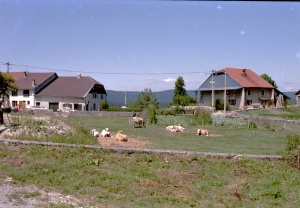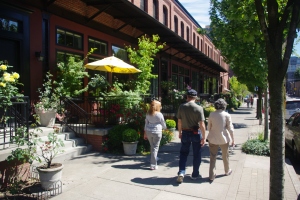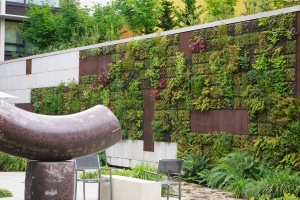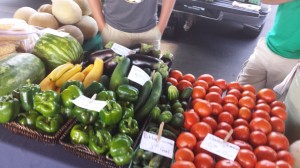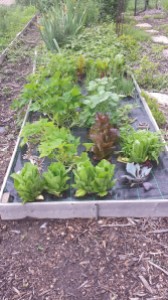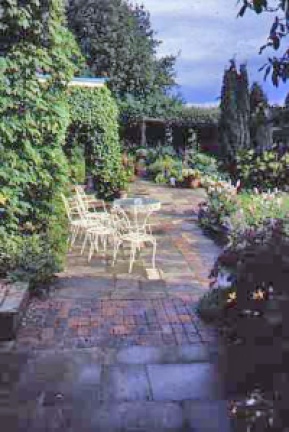- Edibles, Food, Gardening, gardens, Healthy Living, Home & Garden, Landscapes & Gardens, Nature, park, Vegetable Growing
How much do we really know about soil?
“We know more about the movement of celestial bodies than about the soil underfoot.” – Leonardo Da Vinci
Living a healthy lifestyle can mean many things, regular sleep, exercise, reduced stress, enjoying work, balanced eating, learning something new everyday, exploring new sights, meeting friends & relatives or a gentle stroll around a park.
Almost all involve going outside at some stage, or even spending time outside. Like this walk across the Jura Mountains in France.
When we were kids we used to dig in the ‘dirt’ , now it turns out this passed beneficial microbes to us. Plenty of microbes on the Farm.
Today we hear of parks and recreations departments that are banning pesticides and herbicides from play areas, and sports fields – 40 years ago we were more concerned with flint stones breaking the surface of the grass and ‘skinning’ kids knees when they played sports.
Field hockey needed a very even playing surface of grass to be played well, so it was often heavily compacted and over fed to keep the grass green & growing !
Research shows time and again how beneficial taking a walk in a woodland is, or sitting under a tree, or making a garden or landscape.
Yet most of us, move from one hermetically sealed air conditioned room, to our hermetically sealed air conditioned car,
to our hermetically sealed air conditioned office – is it any wonder we are losing a connection with nature?
Those folks lucky enough to live outside cities and away from the urban sprawl , are indeed fortunate.
They can leave windows open at night, refreshing the air inside, removing stale contaminated air, rarely using air conditioning.
We figured a hedge around the house and a tree canopy above was more than enough to reduce the inside temperature 20 degrees or more. It creates its own microclimate between the hedge & the house.while also providing a fair degree of privacy.
The planning process hasn’t helped much either with 140ft set backs, single story developments , individual car parking areas for each business and strip malls, that encourage you to ‘hop’ in the car to go from store to store.
Then same style sub divisions, with all vegetation ‘stripped’ , the topsoil structure almost non-existent at the construction stage, then hardly any landscaping to create interest, shade, or harmony with surrounding areas.
In fact it wouldn’t be too far to say that the effect is boring !
I wonder how many years it takes before this picture changes?
All this contributes to built in obsolescence within 25 years, the developments have very little diversity of style and worse a total lack of walking from home to the stores, – one of the healthiest pursuits for us all.
One of the major advantages of living in towns or cities is this easy connection with homes, stores, work places and amenities.
We all tend to be creatures of habit, so this routine is a hard one to alter
There are signs of a healthier approach.
Mass transit provides a wealth of benefits, less pollution, easier and quicker commuter travelling, safer travelling, an opportunity to connect with fellow citizens. A more relaxed journey.
Green walls in the urban environment soften an otherwise ‘hard’ landscape, reducing the carbon footprint of the area, making a much more ‘pleasing’ view.
Roof gardens make a more focused impact, they improve the carbon foot print, offer a new habitat and an amenity for the buildings users.
It seems all those ideas, methods and activities from yesteryear were not all that bad for us.
Our connection with nature is again expanding with more and more people exploring the option to grow their own food, or seek out farmers markets.
I suspect for this to become even more popular there will be a need to initially at least simplify the mysteries of growing your own?
The Community Garden or Allotment is a great way to learn the ‘tricks of the trade’ – these are either individual growing areas ‘Allotments’ or the more common these days communal ‘Community Garden’
Of course there is the local ‘Pick your Own’ farms for all those inseason goodies.
From ‘Farm to Table’ might be best said as from ‘Grower to Consumer’ – if this were local, it would have a huge impact on carbon emission reductions ( a lettuce travels 1400 miles to reach your table, not sure how that could ever be described as fresh!).
The more we as professionals make this process easier the greater the likely uptake by households in towns and cities, where new skills will need to be developed.
A really easy start.
A stacked group of herbs, perfect for a compact space.
or much more complex, this lovely exhibition garden shows how to create small garden boxes of produce.
Now all we need is a simple method for the consumer… It will need to have an option which includes a growing medium as many urban yards have very poor soil conditions.
This system can be found at www.picagardi.com
Using a unique patented layout grid. enabling almost anyone to place plants in the correct positions is an option.
Listen to our up coming internet radio show all about developing gardens at www.grotrends.com we call it ‘Hort Cusine’ !
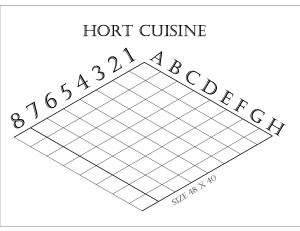
Hort Cuisine Grid The very popular and effective Square Foot Gardening Foundation, developed by Mel Bartholomew has been around for many years, with countless books, examples and users.
As has the New Organic Grower & Four Season Harvest to name but a few from Eliot Coleman, an amazing grower in Maine.
It’s time to really try and add herbs & veggies into our urban landscapes.
We as landscape professionals need to promote home grown food more when we plan new landscapes for clients.
Views: 161
-
Have you taken the kids to a park recently?
This classic park surrounding the simply stunning Nelson-Atkins Museum of Art is in Kansas City.
It is a great place to start – as long as the temperature are being kind !

Anyone for Badminton? The museum has an exhibit which kids would really enjoy, as long as they are accompanied, it’s a glass Labyrinth.

Picture credit to Chris Smart In other countries..
Alternatively, if you were across the pond in say Paris, France. You could visit a more modern looking park. I think this is Parc de Villette
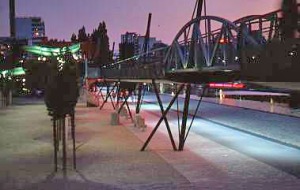
Porte de Villette, Paris or perhaps a more tropical park in say Honolulu.

Honolulu Sometimes just the local school has a pleasant surprise in store, as this school in south London achieved.

A school quiet garden Most parks are designed and built to a high engineering standard. They can last a long time without needing costly repairs.
Over the years we designed & built a huge array of children’s play areas, mostly in parks or on community housing sites, occasionally in a school, the one above was a really fun project, quite a few years ago now.
The idea was to have a theme for the closed in ‘quiet’ area, so the architect suggested a ‘Kentish Riverbank’ We developed a dry river bed using kidney stones set in a flowing pattern, added a jetty to link the ‘Oast’ house from the ‘Kentish Barn’ , included a loading ramp – to enable wheel chair access.
Then created a few sail boats with trees for masts and sails. All the planting was native to a Kentish riverbank along the dry river, with more architectural plants around the edge.
We added a ‘hump back bridge’ in natural stone & a fallen oak tree, from years back when there was a very large storm.

School Garden One of the art teachers had the kids create a whole series of ceramic fish which we set into the river bed, they make excellent brass rubbings !

Ceramic Fish for Riverbed. Children love to interact with nature, they also enjoy movement. They oddly like some risk. You will notice though that here we kept away from moving objects as this was a ‘Quiet Garden’ .
City parks in recent years have tended away from moving pieces of play equipment, mainly due to the liability from accidents, they use a more static type of play equipment, although the classic swing is still in evidence in many parks to this day.
More awareness of other dangers has lead to many play areas being fenced in, to protect the children playing.
Visiting a local farm is yet another wonderful experience “Pick you Own’ farms can be a wonderful treat for the kids..
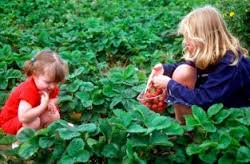
Fruit picking Here in Weston, Missouri we have a classic old style farm that is just enchanting.
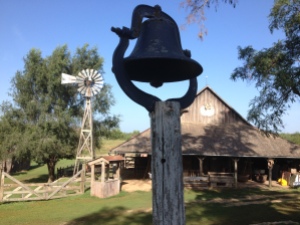
Early one morning , Weston Red Barn Farm Ann & I, interviewed Farmer Steve last week he will be on our show very soon, to tell you how busy he is kept with all his animals and field of fruit and pumpkins not to mention around 15,000 kids visiting his farm each year !
You can hear our other interviews at Growing Trends
Or you can visit our show web site at Landscape Knowledge.com to read more
Enjoy your weekend, thank you for reading our blog, we would love to hear from you.
Ann & Chris
Views: 35
-
A rare moment of peace in the perfect haven of a landscaped garden

Classic English Garden “The commitment & sheer hard work required to achieve career success nowadays takes a heavy toll on our lifestyles. All of us need to counterbalance a busy working schedule with the right level of relaxation. For centuries gardens have been places of retreat and contemplation where our minds, detached from everyday problems, can resolve conflicts and plan confidently for the future.”
“A rare moment of peace in the perfect haven of a garden brings us renewed harmony with nature”

A short stroll to the patio There is something rather special about returning home from work , seeing your beautiful landscape, perhaps pouring a glass of wine, or beer, then taking a walk around your landscaped garden enjoying the trees, flowers, shrubs, all whilst listening to the insects & birds, before an evening meal.
This tends to be a bit of a chore when the temperature is over 90f with sweat dripping off your forehead with each sip, however once the temperature falls to below 80f it is very much more relaxing.
It’s a great time to water the container plants ,dead head the flowers, check on the veggies , check on the water levels of the ornamental ponds, maybe even pull the odd weed from your immaculate borders. You do have immaculate borders? I mean what would the neighbours say ?

Garden Pond Finally stroll back to the main terrace to complete or restock the beverage..mmmm ‘if only’ I hear you say, alternatively pop into a nearby park at lunchtime for a few minutes peace and relaxation.
Unexpected benefits of gardening
Research is now emerging that suggests that digging in the soil is actually beneficial, as the microbes found in real soil are the very ones that help us feel good . – Perhaps its time for us to develop adult sand pits? No just kidding, all that yucky sand traipsed indoors would wreak havoc with the carpets, “She who must be obeyed” would read us the riot act.
I do think that , garden landscapes are for using, they are not like a trophy, or picture hanging on the wall, they are alive, constantly changing ,constantly in need of nurturing, feeding, watering ,tending but above all else enjoying.
What better way to enjoy than to actually get into the midst of the garden and soak up all those positive ions?

A maturing landscape This beautiful award winning garden was developed some years ago for a very busy client, who had a passion for orchids , immaculate lawns, with filled to the brim shrub borders.
We were often asked how it was that most lawns had these long lasting “stripes”. The secret is two fold, first the mower used has to have a roller behind the cutting blades, it can be a rotary mower, although the best is obviously a cylinder mower, also the roller should be the drive method for the mower .
The second is to make sure that each time you cut , you turn 90 degrees from the last.
The advantage of the cylinder mower is, usually you are cutting finer grass, and it needs to be quite short, a rotary mower tends to tear the grass blades and thus causes bruising, so it never looks as good, but it is able to cut much tougher grass which is usually also much higher in length.

A large main lawn Sometimes when I wished to get away from the constant ringing phone , a product of having great teams, being in constant demand and being easy to contact, I would head out to a clients garden and actually spend an hour or two cutting their lawn for them, although it earned me the reputation of ‘The Gardener in a Suit” as I always wore a suit and tie to work !
It was a great way to recharge the batteries !

The complete lawn Come listen to our interviews at Growing Trends they are all about these amazing folks with a passion for landscape gardening, the experts that help them and the wonderful folk that create them.
We would love to hear from you too….if you visit us at www.growingtrends.org please spend a moment to click our Facebook Like !
Ann & Chris
Views: 107
- Edibles, Food, Garden Design, Gardening, gardens, Landscapes & Gardens, Landscaping, Nature, park, Vegetable Growing
It’s all about the people !

Digital Radio, always on, step through and listen now ! Most people are so interesting, it’s just a matter of coaxing them to talk to you, then asking the right questions.-
Are you passionate about your garden ?,
Do you have a favorite landscape ?,
Would you like to be interviewed ?
We started this series of horticultural based interviews with one simple idea, which was, that within our very diverse industry there were many people :-
both Homeowners,
Designers or Creators,
Builders,
or Visitors and Admirers,
who had fascinating stories to tell about their everyday lives.
We have not been disappointed , in fact, we have been surprised by how many folks have a real passion for all things outside, particularly by how many people would like to reconnect with nature.

Tiger Rhus So with that in mind here is a day in the life of… Ann & Chris. the co-hosts of Growing Trends, we ventured out last Saturday, bright & early, just as the sun was rising :-
5.00 am Saturday
Ann & I had literally, a ‘field day’ on Saturday.
We each got up at the crack of dawn, and went to interview Farmer Steve, at Weston Red Barn Farm
We arrived at 7.30am and had already missed Steve, who had picked a crop of fresh peaches for Cindy ( his lovely wife) to take to market some 50 miles away.

Early one morning , Weston Red Barn Farm Steve & Cindy have, for the past 25 years been slowly developing Weston Red Barn Farm to a traditional working farm, specifically to show kids how farms are part of the community. They have Apples, Peaches, Chickens, Goats, Horses, a Farm Shop, Pumpkin fields, along with a wedding venue. It keeps them very busy throughout the summer and autumn.
8.00am
One of Steve’s farm workers arrives to feed the chickens, goats, ducks, and horses, calls Steve for us, who appears over the horizon in a 4 wheeler…
We set up the Mics, the recorders,then we interviewed Steve for around an hour, it could have been much longer, Steve had a fascinating journey and one that you will be able to hear on our show shortly at Growing Trends Internet Radio
A few snippets : –
They have an amazing 12,000 – 15,000 school children visit them every year !
They have 67 weddings at the farm in a year.!

Old Milk Churns I happen to know one of the current family members , of the family that invented the milk churn, their company was called Express Dairies, they developed the original milk churn to take milk from the ‘shires’ to London on the newly built railways, for the burgeoning population of the city.Needless to say they made a handsome profit !
Of course these days most milk isn’t delivered by horse & cart, or by electric milk floats – yes way back in the 60’s milk in England was delivered by battery powered eco-friendly milk floats, as a youngster I often helped the ‘Milkman’ on his rounds for an extra shilling or two.

Express diaries Ok, so back to the interview.
The Farm is about to lay out it’s Pumpkins for sale so Ann found a few pumpkins lying around and ….posed for a quick picture – they sure look impressive !

It’s fun here… There was even time for a spot of ‘picking’, in my miss spent youth we would go ‘Scrumping’

These look yummy ! 9.30am
With our interview completed, it was time to rush back to interview our second fascinating person of the day.
Alan Sargent was over 4000 miles away, and 6 hours ahead of us, in Petworth, West Sussex in England.

A must for Head Gardeners. Alan has a most varied career in horticulture :-
He has Built or,
Designed and Built dozens of Chelsea Flower Show Gardens,
Design & Constructed Award Winning Landscapes.
Formed a Trade Association,
Judged Garden Exhibits,
Written Books
Found time to be a Head Gardener at one of England’s finest and busiest Estates – the 12000 acre Goodwood Estate – with its 44 acre gardens, airfield, horse racing,and motor racing circuits.

Goodwood estate the race course…

The Race Course the motor racing circuit. – or for the Petrol heads as Alan refers to them !
Alan’s skills are legendary, and he has a keen eye for detail – I am a detail freak too, so I love his workmanship !

One of those more famous English Schools His stone work is superb.
Ann and I were to coin an English expression ‘Plum Tuckered’ – you will need to look up it’s meaning, here’s a clue to replenish the reserves we stopped for breakfast..
10.30am back home.
It was time for that quick breakfast, and of course coffee – coffee in America is so good …
Then we quickly reviewed the recordings, packed up the recording gear. Headed off to the lake some 53 miles away for a well earned break, sailing our little racing cruiser ‘Stiletto’

Stiletto – Capri 25 It’s amazing how relaxing an afternoon sail can be.. this week it was a tad hot at 100f but still fun.
This Weeks Show
This weeks show will be about a fantastic store that brings in it’s very own miniature pony each weekend, where it has a small coral in the ‘Fairy Garden’ at the back of the store. – you can buy all many of things for creating a miniature garden !
We are also talking to Richard Benfield a Garden Tourist Guru, whilst he is on his travels, around the world, we caught up with Richard in Western Australia.. do listen to the show at.. Growing Trends Internet Radio if you, or you know someone that would be fun to interview drop us a line and we will get back to you.
In the meantime we have a website telling you more at www.grotrends.com
You will be able to hear all about Weston Red Barn Farm, along with Alan’s adventures in the coming weeks.
If you have someone in mind we could interview drop us a line briefly explaining who & why.
Ann & Chris.
Views: 27
-
How to start a project from a designer’s perspective.
It’s been many years since I first visited a client to sell my design & build company to them.
In all these years , some things never change and first impressions are always top most in my mind. Fortunately with many years of experience, a huge portfolio, a large portfolio of awards, and dozens and dozens of personal recommendations, it’s a little easier. However one should always remember “You are only as good as your last job” !
My system for want of a better word starts with my secretary, she will engage the potential client, take down details of why they called what they would like and, then make an appointment she knows I can keep – missed appointments or forgotten phone calls are extremely rude and guaranteed to lose you a project.
Because like most males (I suspect), my navigations skills are not particularly good, when she creates a temporary file it includes site directions, phone contacts etc.,
It also includes our questionnaire. We developed this as a means to extract information vital in providing what the customer was really seeking at the price they were willing to pay so that we could “Under promise and over supply” ..
During the initial visit, I will, listen about twice as much as talk, ( for those of you who know me well, this is a very interesting concept) discuss likes and dislikes, make a few notes, walk around the property and take site pictures, as it is usually the lady of the house only during the day, the site questionnaire is left to be completed, along with a fees for design work – I have never not charged for design work ( we may give part back on acceptance of the project), but we have worked on the principal that if you do not pay for something you do not value it !
Nothing is free in this world, and hiding your design costs inside the work is no exception, we are in business to provide an exceptional service at a fair price, that enables us to pay our staff, maintain insurances, replace equipment etc.,etc., finding the right balance is always a challenge.
Whilst walking around the site, it’s a great idea to make notes of access, height restrictions, positions of services, gate widths etc.
This initial visit would usually take about an hour perhaps a little longer, and often the acceptance rate to stage two the design would be around 55%.
Sometimes folks just wanted our award winning design skills, and that was fine as long as they paid the true price for them.
So here is the questionanaire.
Brief description of what you are looking
for : …………………………………………
………………………………………………………………………
………………………………………………………………………
……………………………………………………………………….
………………………………………………………………………
………………………………………………………..
How you use your garden :
Do you have animals ? : Yes / No.Do children play in the garden ? : Yes / No.
Do you like gardening ? : Yes / No.Do you like cutting grass ? : Yes / No
Do you entertain in the garden ? : Yes / No.Do you like relaxing in the garden ?Yes/ No.
What sort of Budget you would like us to Design
to : ……………………………………………………
(It helps enormously if we can have a figure to
work to, we should be able to produce a Design
within 10 percent )
Some items to consider :
Lawns. Yes / No
Shrubberies Yes / No.
Rockeries Yes / NoPonds Yes / No.
Streams Yes / NoFish / Koi Ponds Yes / No.
Paths Yes / NoPatios Yes / No.
Terraces Yes / No.Walls Yes / No.
Ground contouring Yes / NoVegetable gardens Yes / No.
Garden Features :
Garden Shed : Yes / No.Power & Lighting Yes / No.
Irrigation Yes / No.Summerhouses Yes / No.
Greenhouses Yes / NoGazebo’s Yes / No.
Pergolas Yes / NoSeating Yes / No.
Please add any other comments on the back of this sheet,
the more we know the better the design.We also suggested that a likes and dislikes list was created so we knew what to add or avoid.
Finally, rather than try and describe the items or styles we suggested that clients either take pictures, or articles from a magazine or bookmark web pages. so we could begin to build a profile picture of the type of landscape they sort.
We can go into this in more detail on our radio show at Growing Trends on www.cravingtalkradio.com
Views: 34


